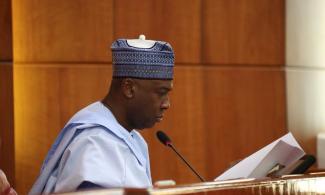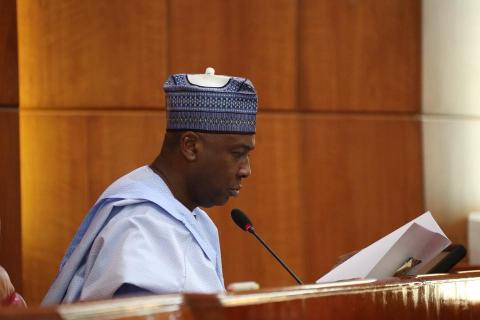
Yes, I’m mindful of the fact that a similar event marked the abrupt termination of PDP’s delusion of three decades of uninterrupted misrule, making it all the more tempting to see visions of APC’s similar fall from power in just a quarter of the time it took the vaunted greatest party in Africa to perfect its demolition work.

The political talk of the town now is the “defection” of politicians from the All Progressives Congress (APC) to the Peoples Democratic Party (PDP). It began last week with fourteen senators and thirty-seven representatives, but Senate President Bukola Saraki and his protégé, Governor Abdulfatah Ahmed of Kwara State, among a few others, have joined the throng. Indeed, to my good friend Olisa Agbakoba — founding president and former colleague at the Civil Liberties Organisation (CLO), now co-convener of the Nigeria Intervention Movement (NIM) — what transpired last week in the National Assembly is nothing short of the warning waves of a political tsunami of mass desertion from APC. And the next wave that will signal the tsunami’s landfall, so to speak, is the imminent defection of seven governors. I shall return to Agbakoba’s interventionist vision presently, especially as I find nothing but sheer opportunism in the 2018 version of pre-election defections. Yes, I’m mindful of the fact that a similar event marked the abrupt termination of PDP’s delusion of three decades of uninterrupted misrule, making it all the more tempting to see visions of APC’s similar fall from power in just a quarter of the time it took the vaunted greatest party in Africa to perfect its demolition work.
While I would not be so brash as to dismiss as inconsequential the exit of fifty-one legislators from any party, in or out of power, I have no misgivings in describing their action as political prostitution. Whatever parallels might be drawn between the exodus of the New PDP group of governors and legislators in 2015 and that of the so-called Reformed APC in 2018, one distinction is clear: n-PDP left for a new party hatched from the merger of three opposition parties and a fraction of a fourth. In bourgeois or liberal democratic politics, differences between the major parties can be minor, though not insignificant for that reason alone. Still, the manifesto of the fledgling APC was different in several significant respects from that of the party they had belonged to for sixteen years and on which they had found compelling reason to turn their backs. Moreover, it was clear then that their desertion was motivated more by the inescapable need for change than by self-serving demands for automatic tickets, or to be shielded from prosecution for corruption in the dawning dispensation. So if it is true that history repeats itself, the second time as farce, then the return of former PDP landlords to the house they had cursed a mere three years ago speaks more of their lack of core values, any value at all, than purported rebellion spurred by betrayal of the people. Though fully complicit in creating the mammoth mess that suffocates the nation, they have done precious little to clear it, devoted as they are to serving themselves in their do-nothing parliament. If truly they be newly minted fatherland-or-death patriots, they would form or join a revolutionary vanguard for people’s power.
Certainly, rationalisations such as this from Governor Ortom of Benue State, perhaps the only one with a smidgen of justification on account of the undeniable terror his people have faced at the hands of land-grabbing Islamic fundamentalist terrorists, is not the stuff of revolutionary change or political conviction. Hear him: “I was in PDP and I discovered that my interest and that of my people was not protected and I left the party. Now, I am in APC and I discovered to my dismay that my interest and that of my people are not being protected in APC . . . But now that the PDP is rebranded and a lot of reforms are going on to ensure that the true tenets of democracy are observed, I feel if I return to the party I will be able to add value to my people.” And that’s it: the insufferable party that he fled has been “rebranded,” but do note what came first in the phrase “my interest and that of my people!” As for the reforms, they must be a top secret of the party which has not even been renamed, something that NIM’s Agbakoba craves as a sign of remorse. It’s all about rebranding, the whitewashing of sepulchres for the illusion of change, or rather “changing the change,” that tautological nonsense slogan now spouted by those who do not know the meaning of the word in a highly fraught socio-political context. I cited Agbakoba earlier simply because he is one of a few among the motley crew of anti-Buhari politicians that has credibility, one I might be in the same trenches with as we once were in the seminal human rights and June 12 days.
Yet even he seems either overwhelmed by the enormity of the task of changing a change process painfully slowed by the lingering effects of the catastrophic reign of the PDP in power, or is driven by the sort of despair we all feel sometimes, or by plain old atavistic fears, to seek hope at the hands of the destroyers-in-chief since our return to civil rule. I do not say this lightly. For, although he avows NIM’s “neutrality and independence,” its non-political party status, and avers a willingness to “work with everybody, whether it is APC, Obasanjo or anyone,” yet he thinks all that PDP needs to be an ally for a better Nigeria is a change of name! Even then, while announcing that “PDP is resisting that change.” But if they won’t change their name and ask “critical leaders of the party [to] step aside,” then NIM would “brand” itself “in such a way that [it] can sell the name PDP.” Branding as change. Clearly NIM loves its neighbour PDP more than PDP loves itself!
I shudder to think that there is any morality of the reformed prostitute that can make a party so vilified and loathed, even by its own, that it was renamed by the victims of its profligacy and moral decadence as the People Destruction Party. Change has been slow in coming, as indeed real social change anywhere, bar a revolution which is often cataclysmic and ultimately regressive. But this has been due in large part to the obstructionist and self-protectionist stance of a legislature led by the rear-guard of corruption and irresponsibility dedicated to stopping any forward movement. As they return to the house they cursed with their own mouth, maybe the right word for the action of the prodigal sons is not defection from, but disinfection of, the party they opportunistically infiltrated in order to cling to power and privilege. APC as the avowed party of change should welcome this chance for renewal and rededication to the burning task of fighting for the soul of Nigeria.
Ifowodo, lawyer, poet and activist, represents Delta State on the governing board of the Niger Delta Development Commission (NDDC).